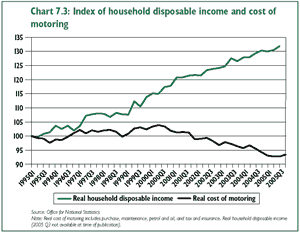A huge amount of work is needed in 2006 by anti-nuclear campaigners to win the battle to avoid a new generation of nuclear power stations being built in the UK.
The first part of 2006 is going to be a tipping point. Whatever the energy review decides will set the scene for Britain's energy future for years to come.
It's therefore crucial to set out the agenda for what needs to be achieved if renewable energy is to play a significant part in that future.
If it doesn't, then the lion's share of investment in new energy infrastructure will go to nuclear power.
A Guardian/ICM poll published on Boxing Day found that 57% of men (33% of women) support nuclear power. This gender split doesn't surprise the Low Carbon Kid - see previous blog on the theme of nuclear power and Prometheus.
The same number of women oppose nuclear power but 39% of men. This averages at 48% against, 45% for.
Why so many for nukes?
The Nuclear industry is spreading lies and disinformation
The nuclear industry has been pouring money into lobbying for some time. They have even fed George Monbiot with figures that persuaded him that nuclear's the thing.
The Nuclear Industry Association, the trade association representing operators of nuclear power stations, and those engaged in decommissioning, waste management, nuclear fuel cycle, equipment, engineering, construction, research, etc. spends a lot of money spreading lies and disinformation about the "safety" and "sound economics" of nuclear power on behalf of its members.
Don't believe me? At a recent sixth form debate at an Essex grammar school, home of future policy makers, the PA sent by the NIA, a Cypriot woman untrained as a scientist, and not long in the job, made a number of false assertions. For instance, that only 12 people died as a result of the Chernobyl accident. And the fallout was negligible here.
Try telling that to the sheep farmers on the Welsh hills where I live who experienced lambs born with five legs and other mutations.
Bernard Cohen, a professor of physics and radiation health at the University of Pittsburgh, has written that the fallout from this accident, "will eventually, after about fifty years, reach 60 billion millirems, enough to cause about 16,000 deaths."
[He also says that the same number of deaths are caused every year by air pollution from coal-burning power plants in the United States alone. Renewable energy? Yes, please.]
Deaths are only part of the picture. For the full picture, and details about the distortion of history, read 'Chernobyl Reinvented'
These nuclear lobbyists have been bending the ears of the Cabinet for some time, whispering that nuclear is ok, the only answer, it's cheaper than you think.
[The Low Carbon Kid believes that Margaret Beckett's days are numbered in the Cabinet, as the only openly anti-nuclear minister. She'll join Michael Meacher as a second casualty of the Blair/Brown anti-environmental stance.]
But don't be fooled by the nuclear industry's dodgy economics either. In Finland, the industry bid below cost price in their effort to secure a contract to build a new power station. After the building had started, they began to demand more money.
Another factor in the nuclear renaissance, reminiscent of the GM story, is that Blair's buddy Bush's administration is also the most aggressively pro-nuclear government since the days of Richard Nixon. The British people fought off much of the GM policies Blair tried to foist on it. But will it do the same to nuclear power?
The renewable industry's agenda
The nuclear lobby's serious points need proper answering.
The industry and campaigners therefore have to do two things:
- Counter these lies
- Set out a blueprint for a renewable energy future
This blueprint must be costed, scaled to the energy demand, and given a timescale, or roadmap, showing what technologies can be introduced when, and at what level to meet the demand.
And we have less than six months to do this.
Happy New Year from the Low Carbon Kid

